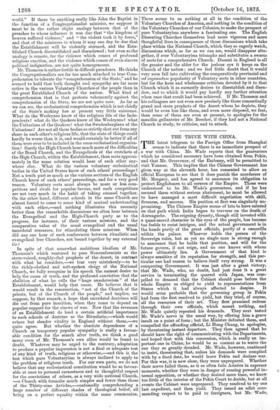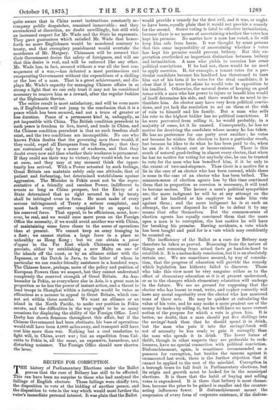THE TRUCE WITH CHINA.
THE latest telegram to the Foreign Office from Shanghai seems to indicate that there is no immediate prospect of a war with China. Mr. Wade reports that the guarantees
which he considered necessary have been obtained from Pekin, and that Mr. Grosvenor, of the Embassy, will be permitted to visit Yunnan. This implies that the Chinese Government has given way at the eleventh hour, has consented to allow an official European to see that it does punish the murderers of Mr. Margary, and has agreed to announce its obligation to protect Englishmen to all corners of the Empire. These were understood to be Mr. Wade's guarantees, and if he has secured them without serious abatement, he must be allowed to have managed a most difficult negotiation with skill, firmness, and success. His position at first was singularly un- promising. The Chinese Empire seems of late to have entered on that path which India began to traverse on the death of Aurungzebe. The reigning dynasty, though still invested with a quasi-sacred character in the eyes of the people, has become too feeble to resist intrigue, and the actual government is in the hands partly of the great officials, partly of a camarilla within the palace. Whoever holds the person of the Sovereign roles, but as yet no single man is strong enough to announce that he holds that position, and will for the future govern, if not reign, and no one knows with whom power ultimately lies. A Government of that kind is always sensitive of its reputation for strength, and this par- ticular one had reason to believe itself very strong. It was a conquering Government. It was just after a great victory, that Mr. Wade, who, no doubt, had just done it a great service in terminating the quarrel with Japan, was com- pelled to demand that the Cabinet should pose before the whole Empire as obliged to yield to representations from States which it had always affected to despise. It would seem probable that the governing group in Pekin had from the first resolved to yield, but they tried, of course, all the resources of their art. They first promised redress through their own officials, which meant nothing, and Mr. Wade quietly repeated his demands. They next tested Mr. Wade's nerve in the usual way, by offering him a grave insult on a point of form ; but the Minister defeated them, and compelled the offending official, Li Hung Chang, to apologise, by threatening instant departure. They then agreed that he should have the right of communicating with the Departments, and hoped that with this concession, which is really an im- portant one in China, he would be so content as to waive the one they so greatly dreaded. Mr. Wade, however, continued to insist, threatening that, unless his demands were complied with by a fixed date, he would leave Pekin and declare war. For this war, it is now clear, they were unprepared. Whether their nerve failed them, as it so often fails Asiatics in supreme moments, whether they were in danger of rousing powerful in- ternal opposition, or whether they desired more time, we know too little of the interior of the Pekin Court to decide, but at all events the Cabinet were unprepared. They resolved to try one last expedient, and then yield. They issued an edict com- manding respect to be paid to foreigners, but Mr.-Wade, quite aware that in China secret instructions constantly ac- company public despatches, remained immovable ; and they surrendered at discretion, no doubt unwillingly, but still with an increased respect for kr. Wade and the State he represents. They gave guarantees which satisfied Mr. Wade that hence- forth no more Englishmen would be murdered contrary to treaty, and that exemplary punishment would overtake the murderers of Mr. Margary. Chinamen will be assured that their Government desire the safety of foreigners, and will see that this desire is real, and will be enforced like any other. Mr. Wade has, in fact, secured without a war all the best con- sequences of a war,—has defeated a most pertinacious and exasperating Government without the expenditure of a shilling or the loss of a man. That is a great achievement, and dis- plays Mr. Wade's capacity for managing Chinese affairs in so strong a light that we can only trust it may not be considered necessary to remove him as a reward, after the regular fashion of the Diplomatic Service.
The entire result is most satisfactory, and will be even more so, if Englishmen will not jump to the conclusion that it is a peace which has been secured, and not a truce of greater or less duration. Peace of a permanent kind is, unhappily, as yet impossible with China. The British condition precedent to such peace is freedom to live, travel, and trade in China, and the Chinese condition precedent is that no such freedom shall exist, and the two conditions are incompatible. No one who knows Pekin doubts that the governing men there would, if they could, expel all Europeans from the Empire ; that they are restrained only by a sense of weakness, and that they doubt every now and then whether their weakness is permanent. If they could see their way to victory, they would wish for war at once, and they may at any moment think the oppor- tunity has arrived. With a Power actuated by such feelings, Great Britain can maintain safely only one attitude, that of patient and forbearing, but determined watchfulness against aggression. The Minister in Pekin must not be the repre- sentative of a friendly and careless Power, indifferent to events so long as China prospers, but the Envoy of a State determined that no right secured to it by treaty shall be infringed even in form. He must make of every serious infringement of Treaty a serious complaint, and must back every serious complaint by an appeal to his reserved force. That appeal, to be efficacious, must, how- ever, be real, and we would once more press on the Foreign Office the necessity, if we would avoid another war with China, of maintaining some force closer to the scene of operations than at present. We cannot keep an army lounging in a fleet ; we cannot station a large force in a place so unhealthy as Hong Kong ; but we can obtain a point d'appui in the Far East which Chinamen would ap- preciate, either by establishing a new Malta on one of the islands off the coast, or by an alliance either with the Japanese, or the Dutch in Java, to the latter of whom in particular we can render friendly assistance in a hundred ways. The Chinese know, perhaps, more of the policy and position of European Powers than we suspect, but they cannot understand completely the reserved strength of Great Britain. An Am- bassador in Pekin, as everywhere else in Asia, is a great man in proportion as he has the power of instant action, and a threat to land troops in Shanghai within a fortnight would be twice as efficacious as a menace to appeal to Great Britain, which can- not act within three months. We want an alliance or an island in the North Pacific, to make our position in Pekin secure, and the difficulties in the way ought to be so many occasions for displaying the ability of the Foreign Office. Lord Derby has shown firmness throughout this affair, but if the Chinese Government had been obstinate, his base of operations would still have been 4,000 miles away, and transport still have cost him more than war. Nothing but a cool resolution to fight will, in China, avert war ; but an expedition from Cal- cutta to Pekin is, all the same, an expensive, hazardous, and disturbing nuisance. The Foreign Office should now shorten the lever.



































 Previous page
Previous page